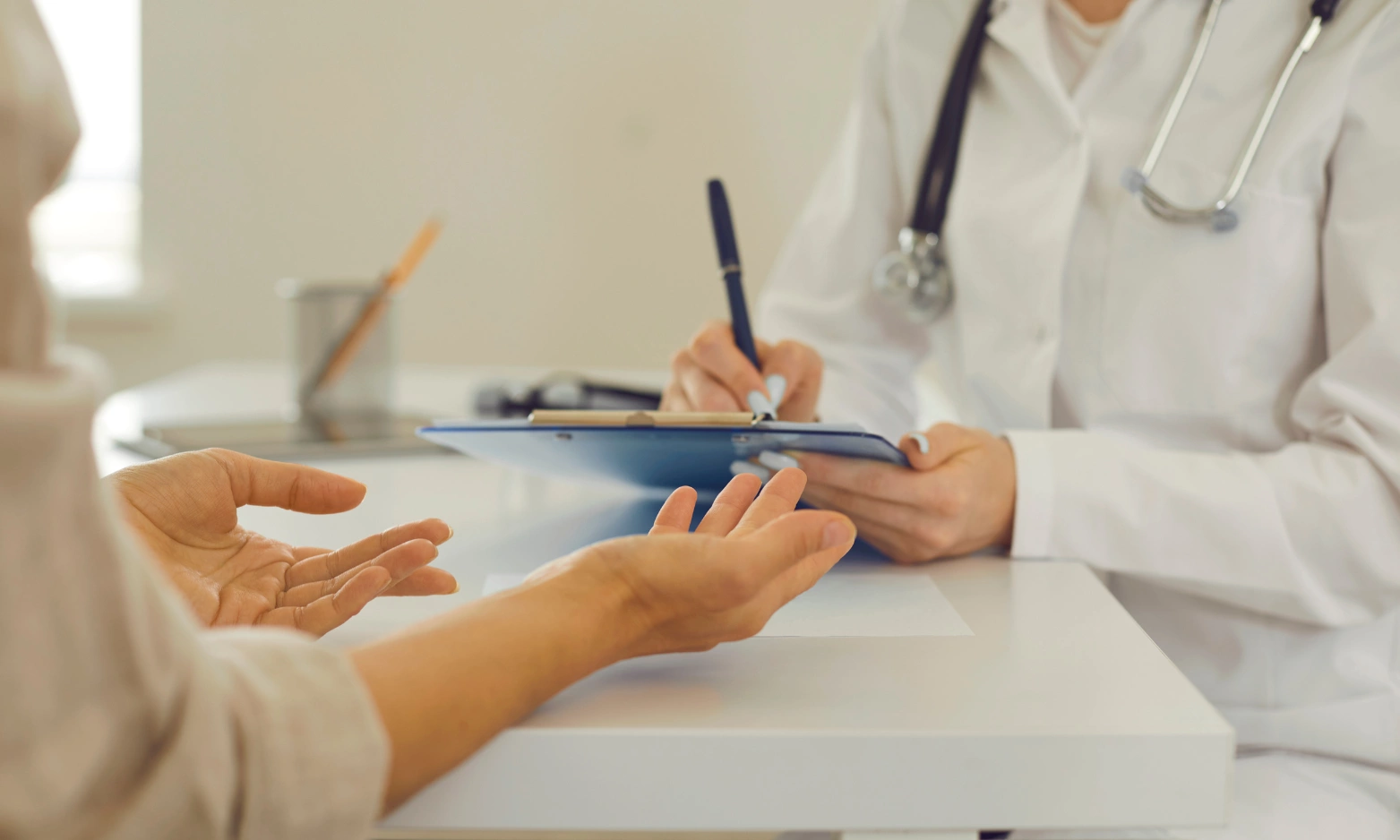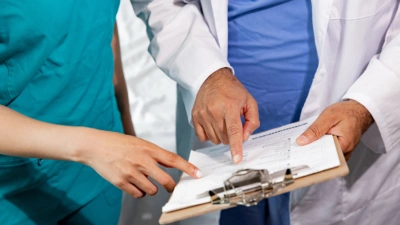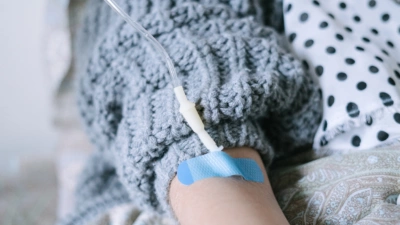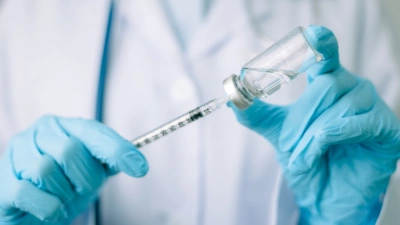Managing common side effects of treatment
There are a number of symptoms of blood cancer or side effects of treatment. Each person’s experience will be different. It is important that you report any side effects to your nurse or doctor because many of them can be treated. Contact your doctor or the hospital for advice immediately (at any time of the day or night) if you are feeling very unwell.
This section helps you manage the more common side effects of treatment, and are listed below.
Anaemia
A low red blood cell count is called anaemia. If you have a low red blood cell count, you may be given red blood cells via a drip (IV), which is called a blood transfusion.
The symptoms of anaemia include:
- Lack of energy (lethargy)
- Feeling very tired all the time (fatigue)
- Shortness of breath, especially when exercising
- Dizziness
- Pale skin (pallor).
Bruising and/or bleeding
If you have a low platelet count (thrombocytopenia) you may bruise easily or bleed more than usual from minor cuts. If you have a very low platelet count, you might be given a transfusion of platelets via a drip (IV) to help stop bruising and bleeding.
The symptoms of thrombocytopenia include:
- Bruising easily
- Minor cuts or injuries that take a long time to stop bleeding
- Frequent or severe nosebleeds or bleeding gums
- Unusually heavy periods in women
- Red or purple pinhead-sized spots on your skin called petechiae (pe-tee-kee-i).
Things you can do to help or prevent bruising and bleeding include:
- Use a soft toothbrush.
- Don’t floss your teeth.
- Don’t shave with a razor blade (men and women).
- Move about carefully so you don’t bump into things or trip.
- Don’t play contact sports such as rugby or hockey.
- Wear protective gloves when doing work around the home or garden.
- Don’t eat food with sharp edges, e.g. potato chips.
- Let your doctor or nurse know if you are constipated.
Constipation
Constipation means that you cannot pass a bowel motion easily, usually because your bowel motions are hard. Tell your nurse or doctor if you are constipated or sore. Hard bowel motions can damage the lining of your bowel and cause bleeding or infection.
Things you can do to help:
- Drink plenty of water.
- Eat more fibre such as cereals, raw fruit and vegetables.
- Do some gentle exercise.
- Tell your doctor or nurse, as they can give you something to soften your bowel motions.
- Talk to a dietitian.
Diarrhoea
Sometimes treatment (e.g. chemotherapy) damages the lining of your bowel wall. This might cause diarrhoea (loose bowel movements) and other symptoms such as:
- Cramping (pains in the lower abdomen or gut)
- Abdominal swelling (swollen tummy/ lower gut).
If you have diarrhoea, the health care team will do a test to see if you have an infection.
Things you can do to help:
- Take the drugs that your doctor or nurse give you to stop the diarrhoea.
- Wipe your bottom with soft toilet paper or flushable wipes.
- Apply a barrier cream around your bottom to protect and soothe the skin.
- Drink plenty of fluids.
- If you are unable to drink fluids, tell your doctor or nurse as you may need to have a drip (IV fluids).
Difficulty concentrating or remembering (chemo brain)
Chemo brain is another symptom or side effect of blood cancers and treatments such as chemotherapy. Chemo brain is also called mild cognitive impairment (MCI). It can also affect people with cancer who have not had chemotherapy. The exact cause of chemo brain is not known.
The symptoms of chemo brain can include:
- Difficulty remembering things, including finding the right word
- Difficulty concentrating
- Feeling very tired.
Chemo brain can be frustrating and it can make everyday life difficult. Things you can do to help:
- Keep a diary of your symptoms.
- Make lists, take notes, and use sticky pads or your phone for reminders.
- Keep a calendar or diary.
- Do mental exercises such as crosswords and puzzles.
- Try to keep calm.
- Do some regular exercise.
- Get plenty of rest and sleep.
- Read short articles rather than books and watch episodes of programmes rather than films.
For more information on chemo brain see our fact sheet here .
Fatigue (extreme tiredness)
Fatigue is very common for people with blood cancers or blood conditions or if you are having treatment.
Extreme tiredness can be caused by:
- Cancer itself
- Chemotherapy and targeted therapies
- Emotional stress
- Poor sleep
- Low blood counts (especially anaemia caused by low red blood cells)
- Muscle loss
- Loss of appetite or dehydration.
Extreme tiredness can have a huge impact on your life. If you have chemotherapy, it can sometimes be several months before you feel your energy levels are back to normal. Some people feel tired for a year or more afterwards. Things you can do to help:
- Have a regular night sleep routine.
- Have regular rest periods throughout the day.
- Don’t try to do too many things in a day, just do the important things.
- Note the times in the day when you have the most energy and set goals to do your main activities at these times.
- Do some light exercise each day. This will help your body condition and make you feel good.
- Keep a diary so you can look back and see your improvements in energy levels over time.
In hospital, your sleep can be very interrupted. Speak with your health care team if you are finding this is making you very tired during the day. Also speak with the team about emotional support if you are having trouble coping due to fatigue.
Useful resources on managing cancer-related fatigue are:
Feelings of isolation
A diagnosis of cancer can make you feel isolated or alone for a number of reasons, including:
- Being unable to continue working, studying or doing the things you usually can.
- Symptoms and side effects, such as fatigue or risk of infection, can make it hard to be with other people or attend social events.
- Financial difficulties can make it hard to maintain social activities or visit family/whānau and friends.
- A lack of support from family/whānau or friends who may not know what to say or do.
Feeling isolated can have an impact on your physical and mental wellbeing. It is important to speak to your doctor, nurse, social worker or LBC Support Services Coordinator if you feel isolated or alone.
Fertility
Fertility means a person’s ability to get pregnant or father a child. Infertility means that you may not be able to become pregnant or father a child. Some chemotherapy may cause infertility. It is important that you discuss any questions or concerns you might have about your fertility with your doctor and nurse as soon as possible.
There may be some things you can do before you start treatment that mean you might be able to have a baby, or father a child, in the future.
For some people, the possibility of losing their fertility can be very upsetting. There is practical and emotional support available. Talk to a member of your health care team. They will help you get the support you need.
Even though chemotherapy can cause infertility, it does not make all people infertile. Chemotherapy can affect a developing foetus, so use a condom when you have sex in the months before, during and after chemotherapy to avoid a pregnancy.
LBC has a Fertility fact sheet for both men and women available here:
Increased risk of infection
Blood cancers, blood conditions and treatments (including chemotherapy, immunotherapy and targeted therapies) can increase the risk of infection.
If you are receiving chemotherapy, you may be at risk of a very low white blood cell count (neutropenia). If this is the case, your health care team should tell you what to do if you develop a fever or other symptoms of infection. Infections during chemotherapy can be very serious and even fatal if you do not seek medical advice quickly for an assessment and antibiotics.
Even if you are not receiving chemotherapy, and do not have a low white blood cell count, you should consider yourself at increased risk of infection due to having a blood cancer. The most common infections in people with blood cancers are chest infections (including pneumonia), skin infections (including cellulitis and shingles) and bladder infections (urinary tract infections or UTIs).
You should promptly see a doctor if you develop fevers or other symptoms of an infection, as you are more likely to need antibiotic or antiviral treatment than someone who does not have a blood cancer. You should ask your doctor about vaccinations against shingles , pneumonia and influenza.
There are a number of things you can do to reduce your chance of getting an infection. These are as follows:
Food
You need to be careful when preparing and cooking food. Be sure to:
- Always wash your hands before preparing or eating food.
- Tell your family/whānau to wash their hands before preparing food.
- Prepare food in a clean place.
- Prepare raw chicken on a separate chopping board from other foods.
- Wash fresh fruit and vegetables well.
- Cook food well and make sure it is very hot.
- Make sure reheated food is very hot.
- Eat food before its best before/use-by date.
- Do not reheat food more than once.
Avoiding viral infections
People with a blood cancer or blood condition may be at increased risk of viral infections. If possible, and particularly if you are currently receiving, or have recently received, chemotherapy, you should:
- Try to avoid people, including children, who are unwell with colds, flu or other infections.
- Try to avoid people who had, or have been near others who have had chicken pox or measles.
Pets
You need to:
- Wash your hands after touching pets.
- Avoid letting a pet lick your face.
- Keep pets clean and treat them for worms and fleas.
- Keep pets away from areas where food is prepared.
- Wash your hands carefully if you come into contact with a litter tray or animal poo.
Gardening
Garden soil can cause infections in people with a low white blood cell count. If you have a low white blood count (neutropenia), you need to:
- Wear gloves, as soil or potting mix can have harmful germs in it.
- Wash any cuts from gardening very thoroughly.
- Check cuts for signs of infection.
- Wear a mask when working with manure or soil to avoid breathing in particles.
Talk to your health care team if you would like more information about preventing or treating infection.
Important information about infection management
- Make sure you have a thermometer at home and you know how to check your temperature correctly.
- If you are currently receiving chemotherapy or if you have been told you are at risk of, or have, neutropenia, you should contact your hospital immediately if you have a temperature over 38°C. Do not wait to see if your temperature goes away as you could deteriorate very quickly. Your health care team should provide you with instructions and/ or emergency telephone numbers if you are in this risk group.
- If you use paracetamol to lower your temperature, record your temperature beforehand and report this to your doctor.
- Be cautious about using aspirin or ibuprofen in any form. These drugs can increase your risk of bleeding if your platelet count is low. Always check with a doctor or nurse first.
- Ask a member of your health care team for the phone numbers of the hospital to call if you develop a fever or other signs of infection that you are concerned about.
Low mood, anxiety, depression or difficulty coping
After finding out you have a blood cancer, it can be common to have a low mood, feel anxious or depressed, or find it difficult to cope. There can be a lot of things that cause these feelings and some people experience these feelings at different times (for example, soon after being diagnosed, during treatment and/or after treatment has finished). Things you can do to help:
- Talk about how you’re feeling with someone you feel comfortable with, e.g. family/whānau, a friend or an LBC Support Services Coordinator.
- Ask your health care team about a referral to a psychologist or counsellor.
- Set yourself daily achievable goals and bigger long-term goals.
- Make a list of things that make you feel better such as your favourite TV show, talking to someone on the phone or doing a hobby.
- Try to maintain your social circle by keeping in touch with friends and family/ whānau.
- Try to spend time each day relaxing, e.g. meditation, listening to music.
- Exercise regularly.
- Try to keep a regular sleep pattern.
- Keep a diary. This can help you express how you feel without needing to talk to anyone.
- Cry if you need to.
- Try complementary therapies such as massage, aromatherapy or reflexology.
It is important to tell a member of your health care team if you continue to have feelings of low mood, anxiety, depression or difficulty coping. They can make sure you get the support you need.
Nausea, vomiting and dehydration
Some chemotherapy can make you feel sick (nausea) or be sick (vomiting). Feeling anxious can also cause nausea and vomiting.
There are drugs called antiemetics which can help treat nausea and vomiting. Different antiemetic drugs work in different ways and you may have one or more types to treat your nausea and/or vomiting. Antiemetic drugs are mainly given as a tablet, an injection or as a skin patch.
Tell your doctor or nurse if you still feel sick because they might be able to try a different antiemetic or give it to you in a different way. Controlling your nausea and vomiting is important so you can keep up your food and drink intake. If you have bad nausea and vomiting and are unable to drink or keep fluid down, it is important you speak with your doctor or nurse to ensure you don’t become dehydrated.
Things you can do to help:
- Eat smaller meals or snacks, more frequently throughout the day.
- Don’t eat foods with a strong smell or taste.
- Don’t eat hot or fatty foods.
- Try fizzy drinks.
- Try ginger tea or ginger ale.
Complementary therapies such as relaxation, aromatherapy or massage might help some people.
Poor appetite and taste changes
You may not feel like eating and have changes in tasting food. This may be because of the chemotherapy, other drugs, the worry of having a blood cancer, or doing less physical activity.
Poor appetite
Having a poor appetite can be disappointing for people who usually enjoy eating. It is important to keep eating to help maintain your weight and energy levels. It is also important to drink plenty of fluids, especially if you are not eating very much.
It can be common for people to really feel like eating certain foods but then by the time it has been made, they cannot eat it. Choose meals that can be made quickly and are easy to eat.
If you are finding it difficult to eat, or are worried about your weight, ask to speak with a dietitian who will be able to advise you.
Things you can do to help:
- Eat small amounts of food as often as possible.
- Keep snacks handy, such as nuts and dried fruit.
- Add extra energy and protein to your diet by using full-fat products or prescribed supplements.
- Eat what you feel like, you can return to your normal diet when your appetite returns.
Taste changes
You may find that your sense of taste changes or that the texture of food seems different. This may mean that you no longer enjoy food, that all food tastes the same, or food has a metallic taste. Your sense of smell can also be affected.
Things you can do to help:
- Eat food cold as it often tastes better and smells less.
- Suck boiled sweets or drink fruit juice as they leave a pleasant taste in the mouth.
- Try different seasonings, such as herbs and spices, on your food.
If you are in hospital and don’t feel like eating the hospital food, ask your charge nurse about suitable foods that family/whānau or friends can bring in for you.
Click here to read our fact sheet on eating well.
Skin changes
Chemotherapy can affect your skin and nails. Your skin may become dry or oily. Your skin can also become red, sore, itchy and more sensitive.
Nails may become brittle and flaky. Ridges or lines may appear on your nails and they can also become painful or swollen.
Things that you can do to help:
- Don’t use soap and perfumed products or products that contain alcohol.
- Moisturise dry skin once a day, or more if needed.
- Use lip balm regularly.
- Don’t scratch.
- Don’t shave with razor blades.
- Use oil-free moisturiser on oily skin.
- Use hand cream regularly.
- Use nail-strengthening cream.
- Wear gloves when doing chores.
Sun protection
After chemotherapy, you might find that the sun burns your skin much quicker than it used to. Things you can do to help:
- Wear sunscreen with a high SPF and reapply regularly.
- Don’t go outdoors in the hottest part of the day.
- Cover exposed skin with clothing.
You should do this for the rest of your life.
If you are having problems with your skin or nails and none of the above suggestions are helping, get support and advice from a member of your health care team or your LBC Support Services Coordinator.
Sore mouth (mucositis)
A sore mouth is an uncomfortable side effect of chemotherapy. Chemotherapy causes damage to the cells in the lining of your mouth and digestive system. The medical name for this side effect is mucositis.
You will usually notice symptoms of mucositis a couple of days after you start chemotherapy.
The symptoms of mucositis can include any of the following:
- Mild soreness of the mouth especially the inside of your cheeks, the sides and underneath of your tongue and the back of your throat.
- Taste changes.
- White rough feeling patches on the inside of your mouth.
- Red and inflamed patches on the inside of your mouth.
- Painful ulcers (sores) on the inside of your mouth.
- Difficulty or pain eating, drinking and taking tablets.
- Thick saliva (spit).
- Sore throat.
- Sore and cracked lips.
Regular mouth care is important for comfort and to prevent infection, especially from mouth ulcers. Doing mouth care can be painful, however it is very important to do it. Mouth care reduces the risk of infection, especially from mouth ulcers.
How to do mouth care:
- Brush your teeth with a soft or baby toothbrush or use a mouth sponge if a toothbrush is too painful.
- Rinse with mouth wash or with water as instructed by your health care team.
- Use a lip balm or petroleum jelly (Vaseline) on your lips.
- Don’t use dental floss as this increases the risk of bleeding gums.
Things you can do to help:
- Suck ice cubes or ice blocks.
- Suck on hard boiled lollies or tinned pineapple if your mouth is dry.
- Drink fizzy water.
- Spit your saliva into a bowl, or if in hospital, ask the nurse how to use the suction.
- Ask your doctor if you would benefit from may prescribe a saliva substitute.
- Don’t eat citrus fruit such as lemon, orange or grapefruit.
Managing mouth pain
Let your health care team know if your mouth is painful, especially if it stops you from eating. Your health care team can advise you on how and when to use pain relief, for example:
- Take painkillers regularly as directed.
- Take stronger painkillers 20 minutes before eating or mouth care as directed.
- Use a mouthwash with local anaesthetic to numb the pain.
Unfortunately, painkillers might not get rid of all the pain.
Sometimes mucositis can also affect the oesophagus (food pipe) and bowel (gut). This can cause discomfort, pain, indigestion and heartburn or diarrhoea. Tell your doctor or nurse if you have any of these symptoms.
Continue mouth care when you go home to make sure your mouth is clean, especially after eating. If you notice any bleeding, ulcers, cold sores or problems with your teeth, let your doctor know. Mucositis should start to get better when your white cell count starts to increase.
Occasionally mouth pain or mouth ulcers may develop as a result of infection e.g. thrush (candida albicans), cold sores (Herpes simplex). These need specific treatment which will be prescribed by your doctor.
Hair loss
Hair loss is a common side effect of intensive chemotherapy. Hair loss usually happens over a number of days or weeks after you start treatment.
You should start to feel and see new hair growing back six to twelve weeks after you finish treatment. It might take longer for some people.
Hair loss can happen on all parts of your body, including on your head, eyebrows, eye lashes, beard or moustache, underarms, pubic hair and legs.
Your scalp may feel sensitive, sore or itchy when your hair is falling out. Things you can do to help:
- Pat your hair gently with a towel to dry it.
- Don’t use heat, such as a hair dryer or straightener.
- Don’t use chemicals, such as hair dye.
- Use a soft brush, some people find baby brushes are best.
Unfortunately, there is nothing you can do to prevent your hair falling out. Stopping brushing or washing your hair will not stop your hair from falling out.
Emotional support
Some people find losing their hair upsetting. Hair, including facial hair, can be an important part of a person’s identity. It is important to acknowledge how you feel about hair loss. If you are struggling with hair loss, talk to your health care team. They can give you information and support.
Other people’s reactions to your hair loss can sometimes be difficult to cope with. It can be helpful for you to talk to them about it first. Children will generally cope well if you talk to them about it and explain why it happens.
There is support for family/whānau members who are struggling to cope with your hair loss. Talk to your health care team to find out about the support available to them.
Shaving your head and head wear
Some people let their hair fall out naturally. Other people have their hair cut off in stages or shave it off before treatment begins as they find this easier than watching their hair fall out.
Things you can do to help:
- Speak to other people who have had hair loss.
- Wear a wig, baseball cap, beanie or woolly hat, scarf or turban. This can make you feel more comfortable. In winter you will probably find it very cold without a head covering.
- In summer, you are more prone to sunburn. Your skin is more sensitive to the sun after chemotherapy so it’s important to ensure you apply sun block and cover up.
As your hair grows back, you may find that it has changed. It may be curlier, thicker, a different colour or grow back unevenly. These changes do not always stay that way forever.




